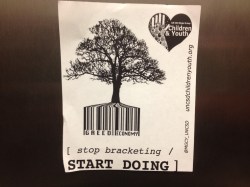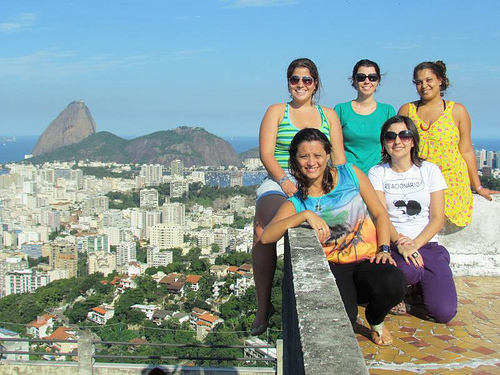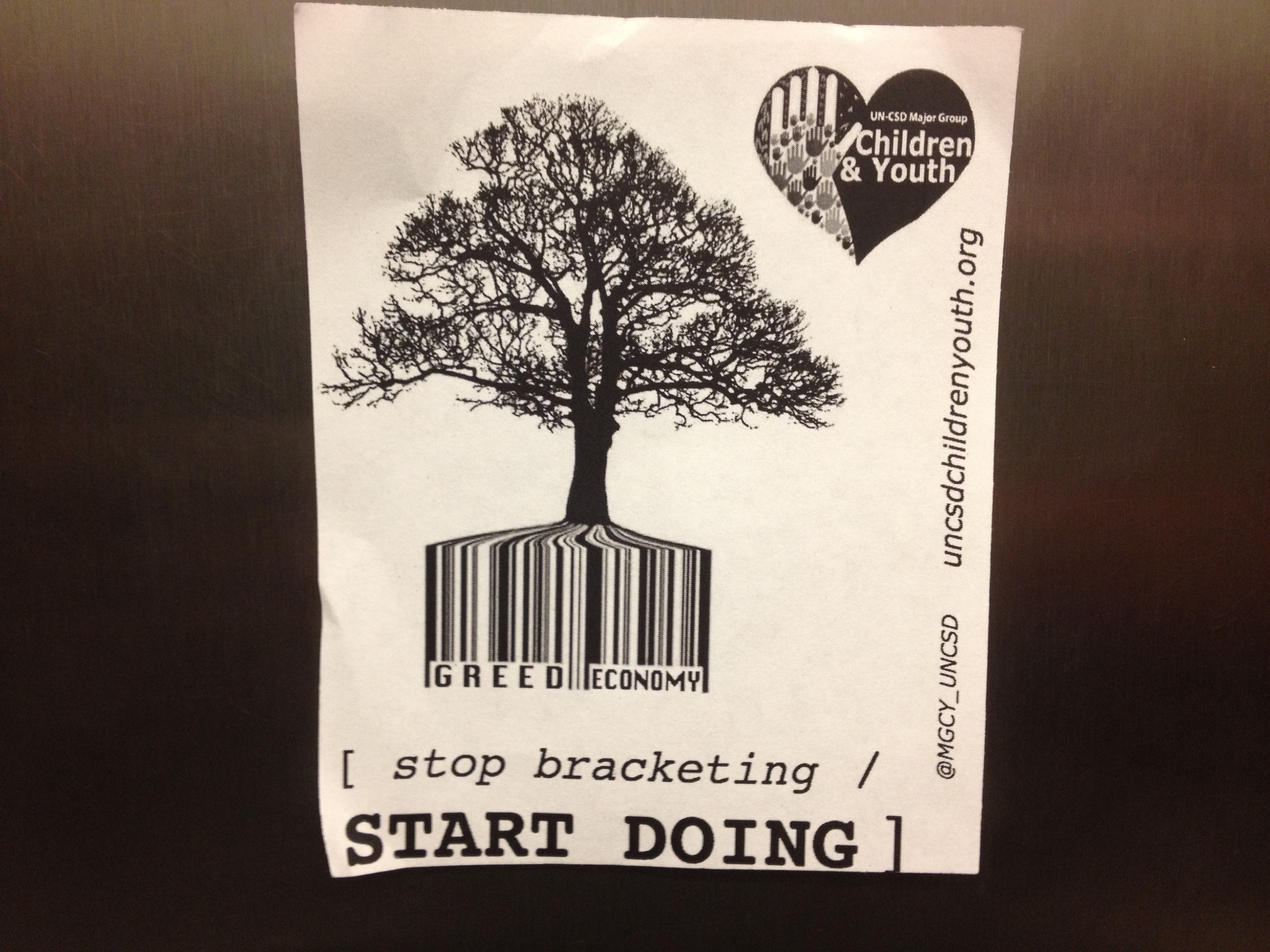
Photo by Sarah Goodyear.
The sticker on the stall door in the women’s room at the United Nations had a simple message: “[stop bracketing / START DOING].”
That slogan would have made no sense at all to me just a couple of days earlier, before I sat and watched the preparations for the Earth Summit that will take place in Rio de Janeiro next month. (If you have no clue what the summit is, check out our primer.) The meetings in New York City, which will resume May 29, are called the “second round of ‘informal-informal’ negotiations on the zero draft of the outcome document.” Here’s what it looks like:
You walk into a cavernous room full of diplomats. Projected on a screen at the front of the room is a paragraph from the aforementioned “zero draft,” which will evolve into the working document that will be up for discussion in Rio. Each paragraph is picked over word by word, with delegations from dozens of countries around the world suggesting word changes and deletions, or disagreeing with other nations’ word changes and deletions. A guy at the front of the room types it all in for everyone to see, putting the suggested changes in brackets, like this:
We reaffirm support for the implementation of [national – Canada delete; Russian Federation retain] [and sub-national – US, Russian Federation] [energy – Norway] policies and strategies, [based on individual national circumstances and development aspirations – US delete, Belarus retain] [to combine as / using an – US, Belarus, Norway, Russian Federation] appropriate [the – US Norway delete] energy mix to meet development needs …
You get the idea. That’s not even one sentence out of a document that was running close to 200 pages by the time I showed up to watch the show last week. Later, all of those edits need to get resolved.
You can see why the young activists with the United Nations Commission on Sustainable Development Major Group for Children and Youth wanted to put that message out there: Stop bracketing. Start doing.
Every afternoon during the informal-informal negotiations, there are side events at which smaller groups of people talk about things that might actually get done when the brackets have all been erased and the magical consensus document emerges.
I attended one such side talk, about ocean acidification, at the suggestion of the folks at the Natural Resources Defense Council, who were co-presenters of the event along with the government of Monaco, where cutting-edge research into the problem is taking place. The talk was a great reminder of the fact that all around the world, scientists and scholars and philanthropists and, yes, even bureaucrats are fighting to do real work that combats the effects of the enormous quantities of carbon that we are pumping into our atmosphere.
Take Libby Jewett, director of the National Oceanic and Atmospheric Administration (NOAA) program on ocean acidification, who gave a concise, informative, and chilling presentation about NOAA’s ongoing efforts to monitor and quantify the way that carbon emissions are changing our oceans. Since the beginning of the industrial revolution, the average acidity of the global ocean has increased by 30 percent, and if carbon emissions continue unchecked, it is expected to increase by 300 percent.
Along with Sarah Cooley, an oceanographer from the Woods Hole Oceanographic Institute, Jewett explained how the ocean’s changing pH will have a potentially devastating effect on coral reefs, mollusks, and other forms of marine life that depend on calcification, a process immediately affected by acidification.
When the ocean’s pH has changed in the past, the process took thousands of years, Cooley explained. “Organisms had many, many generations to be selected for these new conditions.” The current situation, she said, could be compared to a human’s blood pH changing in a matter of hours — a potentially fatal event. “This rate of change is unprecedented in geological history,” she said.
Destruction of mollusks and coral could send shockwaves through marine ecosystems, impacting fisheries and the people who depend on them, Cooley and Jewett explained. The impact, according to the data that are currently available, will be worst in the lower-latitude coastal nations — precisely the same places that will be most profoundly affected by rising sea levels and rising sea temperatures brought on by climate change.
Luke Daunivalu, a representative from the island nation of Fiji, spoke about the grave implications for his country. “We are very closely connected to the ocean and the coral reefs,” he said. “Healthy coral reefs and related marine ecosystems are essential to subsistence fishing, tourism, and export.”
The scientists in the room said that they didn’t see any way that acidification could be reversed through geo-engineering. Instead, they advocated for increased research and monitoring. At the local level, Cooley said, decreasing other stressors on the marine environment, such as water pollution and overfishing, might mitigate some of the damage caused by falling pH.
Monaco’s representative to the U.N., Isabelle Pico, thanked the scientists for their presentation. “It’s really refreshing for us diplomats to have you talking about something so concrete. Sometimes we are negotiating about a word and at the end we don’t even know why,” she said, to general laughter.
Then the delegate from Iceland asked what the scientists would hope for from the meeting in Rio. Jewett kept her expectations modest: “Having it confirmed by countries in the document that this is an important issue, and maybe … saying that we are going to put resources and people and time towards working together in this international effort — I don’t know that we can hope or expect more than that,” she said.
It might not seem like much, but an international acknowledgment that carbon uptake in our oceans is a real and pressing problem would be a big deal: Of the 400-plus paragraphs in the zero document, negotiators have thus far been able to agree on the wording of just 21.
It may be that the best we can hope for from the Earth Summit is a broad set of goals for building a more sustainable world. The actual doing will fall to individual countries, communities, companies, and nonprofit organizations long after all the bracketing is finished.
Also:
- Learn what “informal informal” means, and more about the Earth Summit process, here.
- Get the basics on ocean acidification from NRDC’s website, here.




